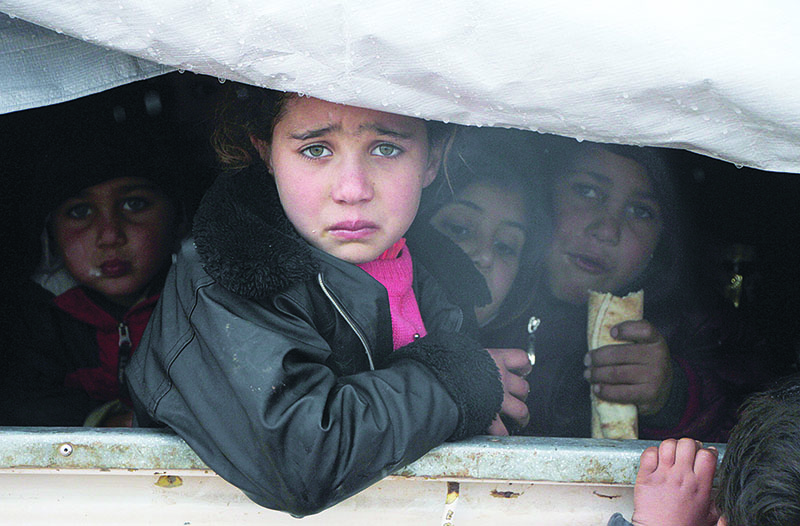
ISTANBUL: Turkey will not withdraw from its observation posts in the Syrian rebel bastion province of Idlib which has seen an increase in violence carried out by regime forces supported by Russian airstrikes, the defense minister said. The posts were established under a September 2018 deal between Syrian regime ally Moscow and Ankara, which backs the rebels, to avert an all-out Syrian government onslaught in Idlib. President Bashar Al-Assad's forces surrounded one of 12 Turkish observation posts in Idlib province on Monday after overrunning nearby areas in a push to take the last opposition holdout, according to the Syrian Observatory for Human Rights.
"We respect the agreement reached with Russia and we expect Russia to abide by this agreement," Turkish Defense Minister Hulusi Akar said in comments published on Sunday on the defence ministry's Twitter account. "We will by no means empty those 12 observation posts, we will not leave there," Akar said. His comments came during a visit, together with top army commanders, to the southern province of Hatay on the Syrian border to inspect Turkish troops on Saturday. Turkey, worried over a new wave of refugees from the Idlib region, is pressing for a fresh ceasefire deal, as it sent a delegation to Moscow on Monday.
"We are doing what's needed to put an end to this massacre," Akar was quoted as saying by the official news agency Anadolu. He said Ankara expected Damascus ally Russia to "use its influence on the regime in order to stop ground and air assault" in Idlib. The latest violence has displaced more than 235,000 people and killed scores of civilians, despite an August ceasefire deal and international calls for a de-escalation.
The Idlib region hosts some three million people including many displaced by years of violence in other parts of Syria. "As long as this pressure remains in place, it will trigger a new migrant wave and put further burden on Turkey which is already hosting nearly four million Syrian brothers," said Akar. Around 300 protesters-mostly Syrians living in Turkey -- held an anti-Moscow demonstration near the Russian consulate in Istanbul on Saturday against the intensified attacks in Idlib, shouting "murderer Putin, get out of Syria!", referring to Russian President Vladimir Putin.
Libya timetable
Akar's visit to soldiers on the border region comes as Turkey is also readying to send troops to support the UN-recognized government in Tripoli against strongman Khalifa Haftar's self-styled Libyan National Army. "The Turkish Armed Forces are ready for whatever task is given in order to protect our country and people's interests," Akar said.
President Recep Tayyip Erdogan on Thursday said Ankara would respond to an invitation from the Libyan national unity government and that the Turkish parliament would vote on a motion to send troops as soon as it returns from recess as early as next month. Ankara signed in November a security and military cooperation deal with the Tripoli-based Government of National Accord (GNA) but in order to send troops, parliament needs to vote through a motion as it does for Iraq and Syria.
Anadolu news agency, citing sources in Erdogan's ruling party, reported that the timetable could be brought forward and the motion could be presented to the parliamentary speaker's office on Monday. The General Assembly could vote the measure in an extraordinary session on Thursday, it said. Parliament is due to return from recess on January 7. The European Union meanwhile, called on Syria's regime and its allies to halt "indiscriminate" military attacks on civilians in the country's north west, where an intensifying bombardment by Damascus and Russian forces has displaced tens of thousands.
Civilians have streamed out of affected areas of jihadist-dominated Idlib province in recent weeks to escape heightened attacks on the southern edge of the final major opposition-held pocket of Syria, eight years into the country's devastating war. "The escalation of violence in the Northwest of Syria by the Syrian regime and its allies must cease," the EU said in a statement by spokesperson for European Foreign Minister Josep Borrell, which said airstrikes and shelling had led to "countless civilian deaths".
"All parties have the obligation to protect civilians. The regime and its allies must cease indiscriminate military attacks and respect international humanitarian law," the statement said. Violence has intensified since mid-December despite an August ceasefire deal and international calls for a de-escalation. More than 235,000 people fled the area between December 12 and 25, mostly from the beleaguered city of Maaret Al-Numan, according to the United Nations' humanitarian coordination agency OCHA. The EU called for urgent unhindered humanitarian access to the three million civilians thought to be living in Idlib province.
It acknowledged that "terrorist groups" were operating in the region, but stressed that combating these networks "does not permit the undermining of international humanitarian law or the targeting of civilians". The Idlib region is dominated by the country's former Al-Qaeda affiliate, Hayat Tahrir Al-Sham. Residents in the province mainly depend on critical cross-border aid, which came under threat in December after Russia and China vetoed a UN Security Council resolution that would have extended such deliveries for a year.
The move raised fears that vital UN-funded aid could stop entering Idlib from January unless an alternative agreement is reached. The Damascus regime, which now controls 70 percent of Syria, has repeatedly vowed to take back the region. Backed by Moscow, Damascus launched a blistering offensive against Idlib in April, killing around 1,000 civilians and displacing more than 400,000 people. Syria's war has killed over 370,000 people and displaced millions since beginning in 2011 with the brutal repression of anti-government protests. -AFP










